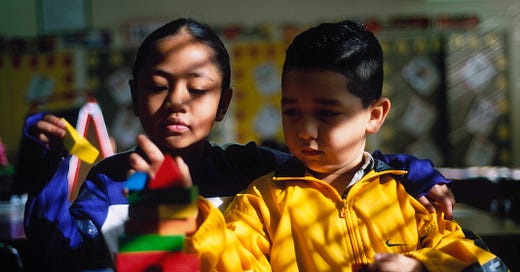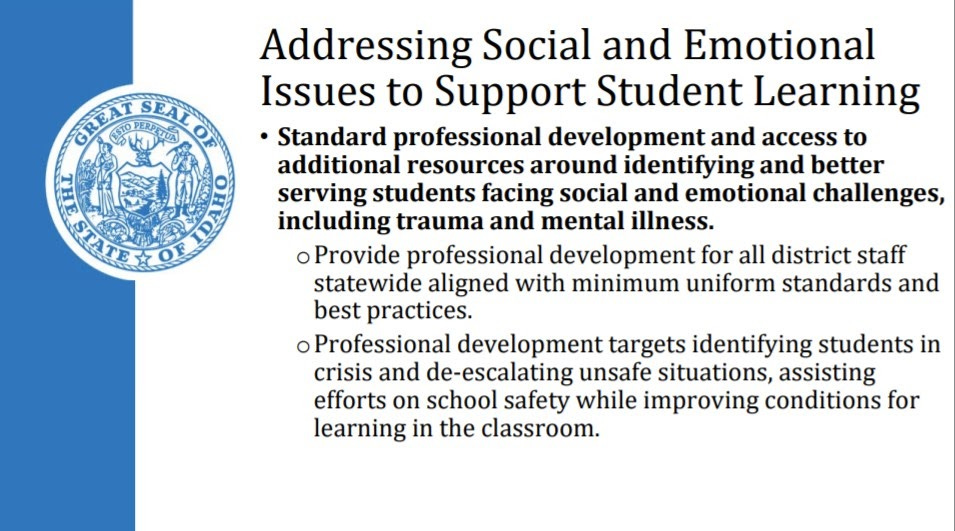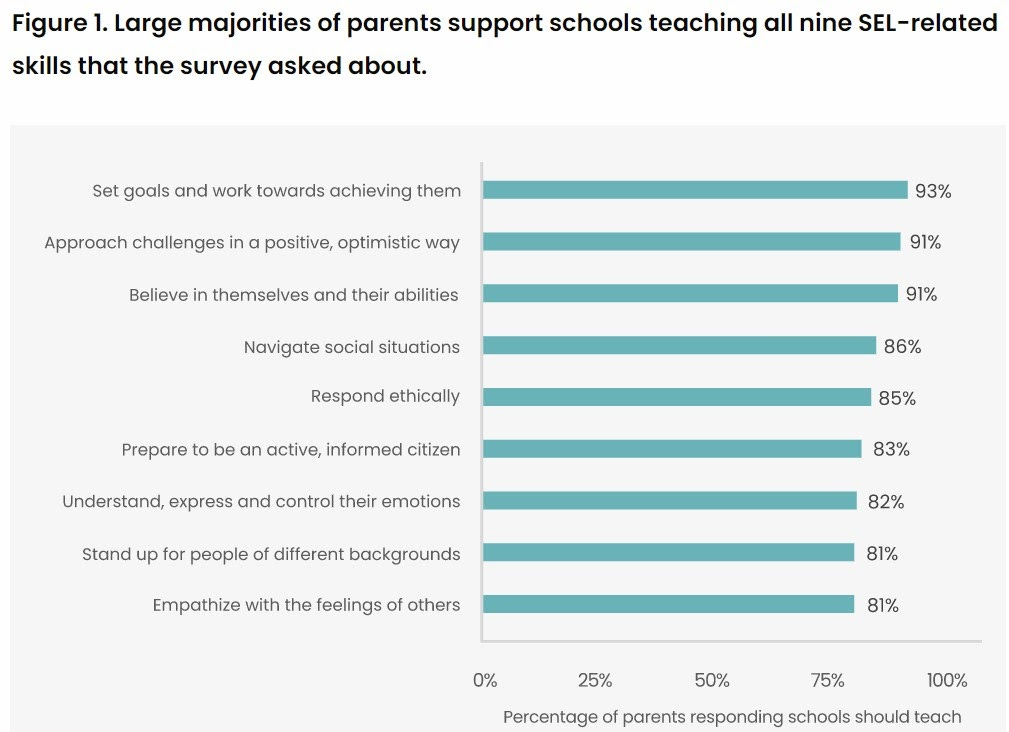Across the country, conservatives are mobilizing against the inclusion of Critical Race Theory (CRT) in K-12 education. There is just one problem: CRT is a complex theory developed by law professors and included postgraduate education. It is not taught in K-12 schools.
So the same activists have switched their focus to something that is included in schools' curricula: Social-Emotional Learning (SEL). Right-wing critics have called SEL "racist garbage," "anti-white," and "a vehicle for introducing leftist propaganda in the classroom." The argument is that SEL is a vehicle for CRT and should be eliminated.
What is SEL? Broadly, SEL helps develop skills "not necessarily measured by tests," including "critical thinking, emotion management, conflict resolution, decision making, [and] teamwork." The SEL framework focuses on developing skills "across five areas of social and emotional competence" — "self-awareness, self-management, social awareness, relationship skills, and responsible decision-making."
The term SEL was popularized in a 1997 book. But the concept is rooted in the idea of character assessment and development that dates back at least to Benjamin Franklin in the mid-1700s.
Maurice Elias, professor of psychology at Rutgers University and Director of Rutgers' Social-Emotional and Character Development Lab, explained to Popular Information that SEL is based on "neuroscience and other research" that shows "the role of emotions in learning." He stressed that "these factors are color blind" because all kids "do not learn well when they are scared, hungry, threatened, depressed, drug-involved, or unhealthy." SEL education can benefit all children "regardless of race, religion, sexual orientation, economic status, [or] political affiliation of their parents."
Elias emphasized that SEL does not instruct students to adopt a political ideology. Rather, students learn skills like problem-solving, organization, focus, preparation, collaboration, and emotional awareness. Removing SEL from schools, Elias says, will harm all children — including those with parents that oppose CRT.
SEL does not seek to enforce uniformity; it encourages respectful disagreement. One SEL technique that Elias helped develop is called "Respectful Debate." In that exercise "students have to take both sides of an issue and in doing so, must listen carefully to the views of the other side and be able to replicate them" to demonstrate full understanding. SEL, Elias notes, is "about the process, not the outcome."
Importantly, research has shown that incorporating SEL into school curriculum "bolsters academic performance." An analysis of 270,000 students in 2011 found that "SEL interventions that address the five core competencies increased students’ academic performance by 11 percentile points, compared to students who did not participate." The same study found that students participating in SEL programs "showed improved classroom behavior, an increased ability to manage stress and depression, and better attitudes about themselves, others, and school." Another study, published in July 2021, found that SEL is effective at "enhancing young people’s social and emotional skills and reducing symptoms of depression and anxiety in the short term."
The impact of SEL education, research shows, is long-lasting. A 2015 study "found significant associations between social-emotional skills in kindergarten and young adult outcomes across education, employment, criminal activity, and mental health." As a result, "every dollar invested in SEL programming yields $11 in long-term benefits." These benefits "include reduced juvenile crime, higher lifetime earnings, and better mental and physical health."
Now, these benefits are at risk. Conservative activists, as part of a political strategy, are trying to stigmatize SEL and purge it from schools.
The consequences of politicizing SEL
SEL only recently became politically controversial. That's why all 50 states have SEL standards for Pre-K students and nearly 30 have established SEL standards for K-12 education.
In Idaho, state superintendent Sherri Ybarra, an elected Republican, has "advocated the need for social-emotional learning in Idaho schools." Establishing SEL standards was a key recommendation from a 2019 education task force established by Idaho Governor Brad Little (R).
But this month, the Idaho State Department of Education decided not to act on the recommendation because SEL has become a political football:
The work plan is missing one of the recommendations from the state group: Adopting a common framework for discussing social-emotional learning in Idaho’s classrooms.
The SDE leadership team decided not to pursue that recommendation in light of a national poll suggesting the term “social-emotional learning” is unpopular with parents, and the divisive political rhetoric around the term, Studebaker said. Social-emotional learning (SEL) has been drawn into partisan debates around whether schools are teaching critical race theory, or trying to “indoctrinate” youth with liberal ideology.
While a Fordham survey found that the term SEL was mildly unpopular with parents, there was overwhelming support for schools to teach the skills that are at the core of an SEL curriculum.
This month, the Idaho State Department of Education announced that it would continue to pursue SEL education, but stop using the term. “We are not distancing ourselves from the concept of SEL, and the important work of supporting students,” Idaho State Department of Education spokeswoman Kris Rodine said. “But the term ‘social-emotional learning’ has recently been co-opted to become a point of controversy."
North Dakota, which Trump won by 35 points in 2020, established SEL standards for K-12 students in 2018.
Virginia, Tucker Carlson, dark money, and SEL
Parents Defending Education (PDE), the dark money group connected to the Koch political network established in March 2021, is at the forefront of politicizing SEL. The group is particularly active in Virginia, where much of its leadership is based.
In 2020, the Virginia legislature passed legislation to establish SEL standards. It cleared the legislature with large bipartisan majorities in the House (72-26) and the Senate (27-11). PDE recast this as a leftist plot to "indoctrinate" Virginia students with Critical Race Theory.
PDE took issue with the draft standards produced by the Virginia Department of Education, which provides guidance, not requirements, for schools. For 5th and 6th graders, it includes standards such as: "I can identify the importance of setting academic goals for personal growth." PDE objects to a handful of standards, including this one for 11th and 12th graders: "I can make ethical decisions about when and how to take a stand against bias and injustice in my everyday life or community." The idea that bias and injustice exist in the world, and that people should respond to those issues ethically, is not a radical theory.
Later, PDE objected to Fairfax County Schools contracting with a consultant to conduct an ongoing survey of students about SEL issues. The questions included in the screener undercut the idea that SEL education is about political indoctrination. Instead, students are encouraged to consider a variety of viewpoints and have respectful disagreements. The questions include:
If you fail at an important goal, how likely are you to try again?
When things go wrong for you, how calm are you able to stay?
During the past 30 days, how carefully did you listen to other people's points of view?
During the past 30 days, to what extent were you able to disagree with others without starting an argument?
There are only two questions related to race and, again, the questions are centered around considering other people's perspectives and productive dialogue:
How often do you think about what someone of a different race, ethnicity, or culture experiences?
How confident are you that students at your school can have honest conversations with each other about race?
Parents have the option to opt out their children from the survey. Nevertheless, this screener was reframed as a "scandal" when, earlier this month, Asra Nomani, PDE's Vice President for Strategy and Investigations, reported that the company developing the screener, Panorama Education, was co-founded by Xan Tanner, who is married to Attorney General Merrick Garland's daughter.
Nomani asserted that this was a "conflict of interest." She claimed the Department of Justice announced on October 4 that it will address "violent threats against school board officials and teachers" to benefit Garland's son-in-law.
This all makes very little sense. Neither Garland nor his son-in-law financially benefits from addressing violent threats against school boards. But Garland was questioned about the alleged conflict on October 21 by Congressman Mike Johnson (R-LA). Here is the exchange:
JOHNSON: Did you have the appropriate agency ethic official look into this? Did you seek guidance as the Federal regulation requires?
GARLAND: This memorandum is aimed at violence and threats of violence.
JOHNSON: I understand that, but did you -- excuse me -- did you seek ethics counsel before you issued a letter that directly relates to the financial interest of your family, yes or no?
GARLAND: This memorandum does not relate to the financial interests of anyone.
Nevertheless, the controversy landed Nomani an invitation on Tucker Carlson's Fox News show. Carlson began the segment by claiming that "Garland's son-in-law [is] profiting from racist theories taught to your children." He added that Garland was a "repulsive little sleazeball" who "sicced the F.B.I. on people who criticize his family's business."
During her appearance, Nomani claimed there is "no evidence" that SEL education is "effective" for students. Rather, it was a "Trojan Horse" for "consultants that bring in the very divisive ideas of critical race theory."








This business about SEL is the definition of a bogeyman. The Republicans don't even care about being remotely plausible with their conspiracy theories and it legitimately scares me.
Wasn't the lack of SEL part of why these exact people were pushing me to physically send my kids back into the classroom last year? The argument being that children were missing out on SEL when they were stuck at home behind a computer screen? Now these exact same people want me to believe that SEL (the thing they argued for) is bad for my kids? Maybe if these people had been taught to think critically as children it wouldn't be so easy to suck them into each new republican political strategy aimed at dividing people and ginning up controversy where there is none. Shouldn't these people be busy warning us about the fake dangers of Halloween candy or posting racist Minions memes to Facebook or something?